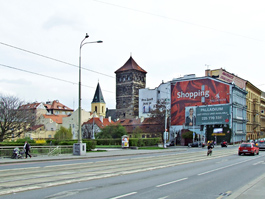
<Project construction in Revoluční is coming to life, the investor has chosen a different author>
 |
| photo: Kateřina Bečková |
The Novomlýnská brána project aims to complete Revoluční Street and serve as a sort of gateway to the city center from the river. An unusual building that involved the demolition of a neo-Renaissance building, currently devastated, and the incorporation of a low Baroque house was presented by Brobosu Properties at the beginning of last year.
In the location where there has been a gap for over 70 years, DaM proposed a structure that was not meant to be a traditional city building - it does not have a classic façade with windows. The building is to have an abstract shape, and its exterior was to be covered with perforated copper-colored sheet metal. The building was to include a passageway that would provide access to a picturesque nook leading to Lannova Street.
Experts from the National Heritage Institute did not like the project, but city heritage officials gave it approval. The Ministry of Culture, as the appellate body for state heritage care, later changed their decision and ruled that the demolition of the historical house was unacceptable. The owner of the house and investor appealed, and the Ministry's appellate commission dealt with the case until this year when it returned it to Prague's heritage authorities. By that time, however, the new investor had already had a project that did not want the new building in the proposed form.
The design of the building, which was more of a sculpture than a house, provoked negative responses among proponents of a conservative approach to urban development - as has been the case in Prague with almost all planned buildings that diverge from the tested model, for at least the last hundred years.
The new investor has approached architects of their choice and is consulting the preparation of the building with the Club for Old Prague, which heavily criticized the previous proposal. RSJ Private Equity claims that it wants to give Prague a new architectural landmark that resonates with the historic center. Karel Janeček, the founder of RSJ, is a member of the supervisory board of RSJ Private Equity.
The English translation is powered by AI tool. Switch to Czech to view the original text source.
2 comments
add comment
Subject
Author
Date
co chteji
rades
12.09.13 06:59
co chteji?
takyarchitekt
13.09.13 02:22
show all comments
Related articles
9
26.03.2024 | The winner of the competition at Revoluční 30 is the Peer collective and Studio Muoto
1
13.03.2017 | Prague will announce an architectural competition for the design of a building for the epic
3
31.01.2017 | Prague 1 wants a golden glass gallery at the end of Revoluční Street
0
06.02.2016 | The magistrate agrees to the demolition of the house on Revoluční, opposed by the NPÚ
0
20.10.2015 | The new construction project in Revoluční will apply for a zoning decision
28
22.11.2014 | The new building on Revoluční by Eva Jiřičná is changing, it doesn't have green light yet
2
19.09.2013 | The new house on Revoluční Street should be designed by Eva Jiřičná
0
18.07.2013 | The Novomlýnská Gate will not be built according to the original design
0
22.05.2013 | The ministry returned the construction project on Revoluční to the magistrate
2
28.06.2012 | Investor of the construction in Revoluční must not demolish the old building
15
12.01.2012 | The house on Revoluční is supposed to stand on city-owned land, it is said to agree
0
09.01.2012 | The architectural competition at Novomlýnská Gate did not take place
7
08.01.2012 | <br>Stomping over Revoluční<br>
10
05.01.2012 | New house on Revoluční causes controversy
46
04.01.2012 | At the end of Revoluční Street, there could be a house by DaM












